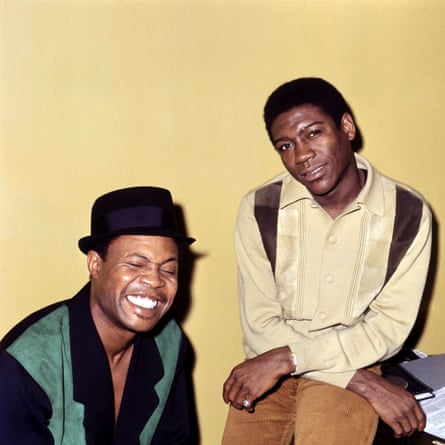Sam Moore had put out a Christmas album in 1998, but it wasn’t until 2006 that he released his debut solo album proper. There was clearly something tongue-in-cheek about its title. Overnight Sensational arrived a quarter of a century after the duo he had formed with Dave Prater had finally broken up after decades of acrimony: before the split, Sam & Dave had not actually spoken to each other for 13 years, Moore horrified by a domestic incident in which Prater had shot and wounded his wife.
That it took so long for one of the most lauded figures in 60s soul to release an album under his own name says something about the difficulties Moore faced in establishing himself as a solo artist. Part of the problem was that Sam & Dave’s career had been on the commercial skids ever since they stopped recording at Stax Records’ Memphis studio and working with the songwriting and production duo of Isaac Hayes and David Porter in 1969: fatally, when Stax’s deal with Atlantic Records had ended, the pair stayed on Atlantic, rather than moving to Stax. Moore was also dogged by heroin and cocaine addiction in the years after the duo’s split, claimed that someone had been spreading a rumour that he was suffering from throat cancer in an attempt to harm his career, and had spent most of the 80s still competing with Sam & Dave, Prater having responded to their break-up by simply recruiting another singer called Sam and carrying on as before.

But more striking than the amount of time Overnight Sensational took to arrive was how star-studded and varied its guest list was. You might have expected Bruce Springsteen to turn out: he was Moore’s loudest latter-day supporter, calling him “our greatest living soul singer”, performing with him on three songs from 1992’s Human Touch, bringing him onstage at his Asbury Park Christmas shows, bringing the E Street Band to back him at the Rock and Roll Hall of Fame when Sam & Dave were inducted in 1992, four years after Prater’s death. But so did Mariah Carey and so did country stars Travis Tritt, Wynonna Judd and Vince Gill. And so did Eric Clapton, Jon Bon Jovi, Sting, Steve Winwood and Billy Gibbons of ZZ Top.
That tells you a great deal about the esteem Sam & Dave were held in by their fellow musicians, but, in truth, it is only scratching the surface: their songs were covered by everyone from the Temptations and Tom Jones to Eurythmics and Elvis Costello. At the height of their 60s success, they were called “the greatest live act of all time” by Otis Redding’s manager, whose own charge was hardly a slouch on stage. Nevertheless, after co-headlining with them on the 1967 Stax/Volt tour, Redding declined to share a bill with the duo nicknamed Double Dynamite again: he felt he had been thoroughly upstaged.
Watch the footage of them performing Hold On, I’m Comin’ on German TV, the same year as the Stax/Volt tour, and you can see why. Sam & Dave sound incredible, building to an extended call-and-response finale that feels like it has been transplanted directly from a southern gospel church. And they look incredible too, the selection of dance steps and spins they unleash all the more thrilling for the fact that hardly any of them seem to be pre-planned: 10 seconds of the performance (at 1:30) looks choreographed, the rest improvised. The effect is electrifying, both intense – Moore used to talk about himself “liquefying” during performances; one oft-repeated story has Sam & Dave leaving puddles of sweat on the stage after their shows – and off-the-cuff.
There was a similar combination of power and immediacy in Moore’s voice. The standard line is that his was the sweeter of the duo’s, a tenor that contrasted with Prater’s gruff baritone. But such things are relative: higher Moore may have been, but his vocals were visceral, tough and attacking. The 1967 hit Soul Man was one of the 60s great coded protest songs – a message of Black empowerment disguised as loverman swagger – but from the minute Moore opens his mouth, you might hazard a guess that he was singing about something other than his sexual prowess. For all the song’s ebullient mood – and Moore’s gleeful cry of “play it, Steve!” as Stax guitarist Steve Cropper peels off a lick – there’s a raw, slightly pained quality to his voice suggestive of hard-won experience.
It was their biggest hit, one of a string of 10 straight US R&B Top 20 hits in just over two years. In his bleaker moments, Moore was occasionally wont to complain that the public couldn’t see past the duo’s 60s hits – he once described Soul Man as “an albatross” – which was perhaps understandable: in the UK, his biggest latter-day success came with a re-recording of the track featuring Lou Reed, of all people.
Things might have turned out differently had his 1971 solo album Plenty Good Lovin’ not been shelved after the murder of its producer, King Curtis: finally released in 2002, it displayed a remarkable supporting cast – Donny Hathaway, Aretha Franklin, Betty Wright, the Sweet Inspirations – contriving to update Moore’s sound for a new decade without sacrificing any of its power. But then again, listen to Sam & Dave’s string of 60s hits: I Thank You, Soothe Me, When Something Is Wrong With My Baby. Or better yet, go to YouTube and watch the duo performing them live. Their success might have proved insurmountable, but they were that successful for a reason: as close to the apex of 60s soul as you could wish to get, they’re magnificent.
Source: theguardian.com


